
Ipomoea alba, sometimes called the tropical white morning-glory, moonflower or moon vine, is a species of night-blooming morning glory, native to tropical and subtropical regions of North and South America, from Argentina to northern Mexico, Arizona, Florida and the West Indies. Though formerly classified as genus Calonyction, species aculeatum, it is now properly assigned to genus Ipomoea, subgenus Quamoclit, section Calonyction.
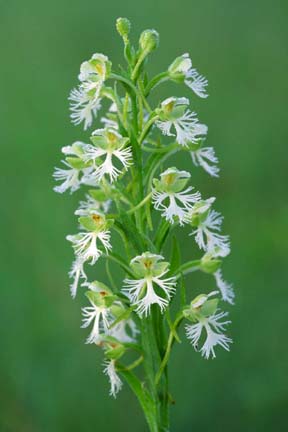
Platanthera leucophaea, commonly known as the prairie white fringed orchid or eastern prairie fringed orchid, is a rare species of orchid native to North America. It is a federally threatened species, protected since October 30, 1989 under the Endangered Species Act of 1973. In Canada, it has been listed endangered under Schedule 1 of the Species at Risk Act since 2005. In 2014, the International Union for Conservation of Nature assessed it as "least concern."
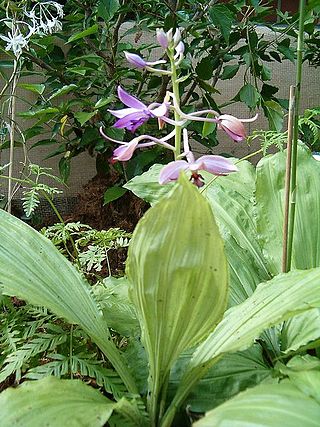
Calanthe, commonly known as Christmas orchids, is a genus of about 220 species of orchids in the family Orchidaceae. They are evergreen or deciduous terrestrial plants with thick roots, small oval pseudobulbs, large corrugated leaves and upright, sometimes arching flowering stems. The sepals and petals are narrow and a similar size to each other and the labellum usually has spreading lobes.
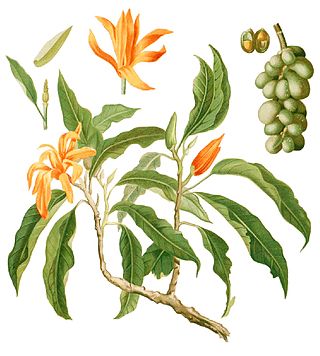
Magnolia champaca, known in English as champak, is a large evergreen tree in the family Magnoliaceae. It was previously classified as Michelia champaca. It is known for its fragrant flowers, and its timber used in woodworking.
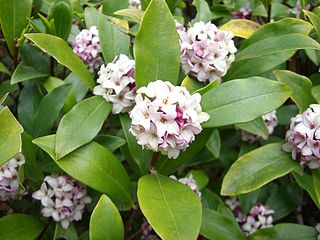
Daphne odora, winter daphne, is a species of flowering plant in the family Thymelaeaceae, native to China, later spread to Japan and Korea. It is an evergreen shrub, grown for its very fragrant, fleshy, pale-pink, tubular flowers, each with four spreading lobes, and for its glossy foliage. It rarely fruits, producing red berries after flowering.

Monodora myristica, the calabash nutmeg or African nutmeg, is a tropical tree of the family Annonaceae or custard apple family of flowering plants. It is native to tropical Africa from Sierra Leone in the west to Tanzania. In former times, its seeds were widely sold as an inexpensive nutmeg substitute. This is now less common outside its region of production. Other names of calabash nutmeg include Jamaican nutmeg, ehuru, ariwo, awerewa, ehiri, airama, African orchid nutmeg, muscadier de Calabash and lubushi.

Phalaenopsis micholitzii is a species of plant in the family Orchidaceae. It is endemic to the Zamboanga peninsula in the island of Mindanao, Philippines.

Alocasia odora is a flowering plant native to East and Southeast Asia. In Manipur, India, its local name is hoomu. Traditionally, A. odora is sometime used as a medicine for the treatment of the common cold in North Vietnam.
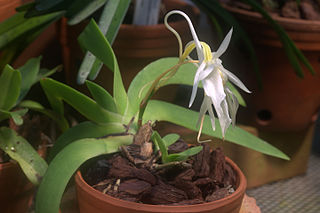
Angraecum leonis is a species of flowering plant in the family Orchidaceae.

Calanthe discolor is a species of orchid. It is native to Japan, and China, Korea. Its vernacular name in Japanese, ebine, (海老根) means "shrimp-root" in reference to the shape of the plant's pseudobulbs and root system.

Coelogyne barbata is a species of flowering plant in the family Orchidaceae. It is a shade-loving orchid that blooms in the months of October–November. It occurs in the Himalayas, Nepal, India, China and Myanmar. It grows epiphytic on trees or lithophyte on rocks in lower montane forests at an altitude of 1000 to 1800 meters above sea level. It is also found in Phalee but is rare. It has long, broad leaves and a bulb stem that grows from the roots. It blooms in September- November. It's a shade loving orchid.
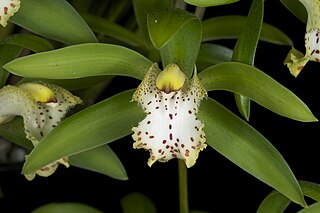
Cymbidium hookerianum is a species of orchid found in India, China, and Vietnam. It is distributed widely in Bhutan, especially in the cool temperate forests.

Dendrobium atroviolaceum is a species of epiphytic orchid endemic to eastern New Guinea. It was described by English botanist Robert Allen Rolfe in 1890 based on a specimen collected by James Veitch & Sons.

Dendrobium uniflorum is a species of flowering plant in the family Orchidaceae. It is native to the Malesia and Southeast Asia regions, in Thailand, Vietnam, Malaysia, Philippines, Borneo, Sulawesi, Sumatra.

Solidago odora, the sweet goldenrod, anisescented goldenrod or fragrant goldenrod, is a North American species of goldenrod within the family Asteraceae. The plant is native to the United States and Mexico, found in every coastal state from Veracruz to New Hampshire and as far inland as Ohio, Missouri, and Oklahoma. It flowers from July through October.

Praecoxanthus aphyllus, commonly known as leafless orchid, is the only species of the flowering plant genus Praecoxanthus in the orchid family, Orchidaceae and is endemic to the south-west of Western Australia. Plants in flower lack a true leaf, although those plants that are not flowering do possess a green leaf. This species is one of the first orchids to flower each year and its creamy white, fragrant flower easily distinguishes it from other species.

Spiranthes odorata, marsh lady's tresses or common lady's tresses, is a species of flowering plant in the orchid family, native to the southeastern United States, from Texas eastwards and northwards to Delaware. It grows in moist, partially shaded environments with acidic or neutral soil.
Thelymitra odora is a rare species of orchid in the family Orchidaceae and is endemic to a small area of South Australia. It has a single erect, channelled, linear leaf and up to four deep blue flowers. It is similar to T. pauciflora but is distinguished from that species by its slaty grey flower buds and a different lobe on top of the anther.

Platanthera dilatata, known as tall white bog orchid, bog candle, or boreal bog orchid is a species of orchid, a flowering plant in the family Orchidaceae, native to North America. It was first formally described in 1813 by Frederick Traugott Pursh as Orchis dilatata.

Streptoglossa odora is a species of flowering plant in the family Asteraceae. It is a spreading, perennial herb with pink or bluish-purple flowers. It grows in Queensland, Western Australia and the Northern Territory.



















